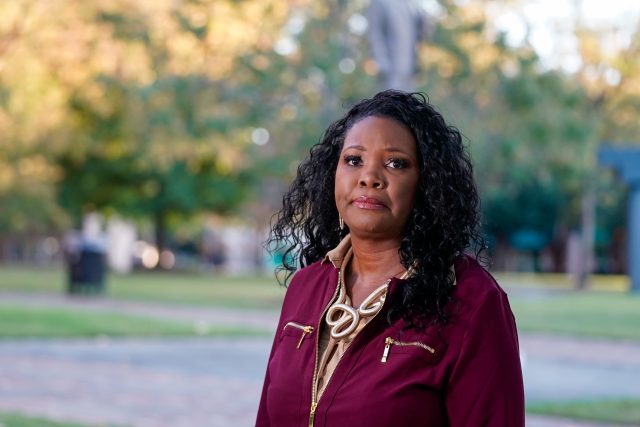
By Sydney Melson
The Birmingham Times
Stephanie Brown has been through it all—domestic abuse, mental health issues, a brain injury. But none of those things have stopped her from advocating for those who struggle to find their own voice.
Brown serves as a women’s rights activist, a peer support member of the National Alliance on Mental Illness, and an unpaid research assistant at the University of Alabama to help mitigate mental health conditions that affect domestic violence survivors.
“Alabama’s domestic violence laws are both antiquated and non-progressive in regard to the rights of victims,” she said. “I intend to be part of the solution for change through ongoing advocacy and activism.”
Her passion is fueled by the trauma she dealt with growing up.
“My mom married [my father] when she was 17 years old to escape poverty,” Brown said. “She believed she was going to live a life she never lived before, but there were domestic violence issues in my father’s family, and he had a lot of insecurities.”
Brown’s mother was later diagnosed with bipolar disorder, which had an impact on her children: “[While we were growing up], a lot of her anger was taken out on my siblings and me,” said Brown, an Ensley native.
The relationship between Brown’s parents led to a lot of strife in the household, as well as physical abuse inflicted upon the children.
Brown recalls going to school with bruises and cuts on her body.
“I still have a scar on my wrist from where I was cut with glass,” she said.
“My two brothers and I were affected by domestic violence in different ways,” Brown said. “I developed a dissociative disorder, where I would become whatever character in a book I was reading to try to escape. It was a coping mechanism for me.”
As she grew older, her dissociation carried into her everyday life.
“It was really exhausting. Nobody on the outside could see what I was going through,” she recalled.
In addition, Brown was sexually assaulted at the age of 5 by two babysitters.
“I remember they used red paint on me as lipstick and took me to an abandoned house,” she said. “When they walked me back home, they told me if I told on them there was a reservoir across the street where all the children who told would go.”
At age 20, Brown married her husband, who abused her both physically and sexually.
“I got through a lot of it by dissociating,” she said. “My psychiatrist says I am considered a sex trafficking victim, despite the fact that I was married to the person who was abusing me. I had to allow him to do things to me in order to have a place to live or food to eat.”
As the abuse worsened, Brown started having health issues and was able to get medical insurance through her husband’s job.
“I found out that I had gynecological problems due to being raped at 5 years old,” she said. “[Plus], my husband was having outside relationships with other women, so I was having more problems because he was bringing infections [home to] me. I had to have an outpatient procedure that required me not to have intercourse until I returned back to her office.”
Brown’s upbringing made it difficult for her to understand that what she was going through was not normal.
“When you’re married you think, ‘OK, this is my husband. I don’t want to do it, but I’m supposed to. My body doesn’t belong to me.’ Coming from a family of patriarchy really affected my ability to use my voice to say no. I was suffering a lot of internal and mental damage,” she said.
Brown divorced her husband in 2013 and went on to become a licensed minister, certified mental health aide, and life coach in 2015 to counsel other domestic violence victims.
Now, at age 52, Brown, who currently is homeless and sleeps in her car, said she felt as if her entire life was taken from her. Despite facing so many struggles, she tries to be an advocate for those in similar situations.
“For me, that was a way to find purpose in my life—by educating others and helping them find solutions to become survivors and change the trajectory of their lives,” she said.



